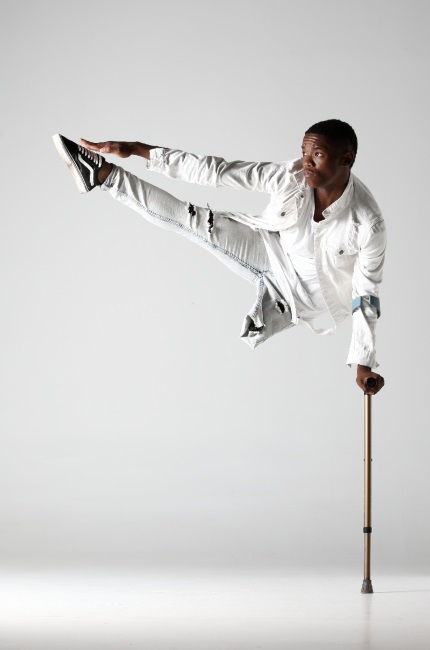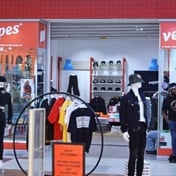
He's just entered the competition and he's already an international sensation.
When the South African dancer entered the Britain's Got Talent stage with his crutches, he had the judges eating out of his hand, even before he started his dance routine.
Once he started dancing, the whole world fell in love with him.
He lost a leg due to bone cancer but that hasn't stopped this talented young dancer from moving with effortless grace on stage – crutches and all!
His movements are graceful and effortless as he glides across the stage in perfect time with the music. Like the best dancers, Musa Motha makes his elegant elevations and breath – taking twists look easier than they are.
But there's something that sets this young man apart from the rest and makes his performance all the more remarkable: Not only is he missing a leg, he's incorporated a crutch into his on-stage feats.
When we chatted to him a few years back, Musa was part of a group of ground-breaking international dancers at the Vuyani Dance Company in Newtown, Joburg, where he dances, choreographs and produces his own music for shows.
This is his story.
He's also won awards at dance competitions across the country, including the Gauteng Matjeko Dance Festival, Dance Against All Odds and the Red Bull Dance- Off.
So passionate is Musa about making a living from dance, he gave up his disability grant in 2017 because, he says, there are others in greater need of it than he is. "I don't need a grant," he says. "I get to go to work every day."
He uses public transport to travel to the Vuyani Dance Company, where he trains and works out with able-bodied dancers. Musa thrives on challenges and is determined not to allow the loss of a leg to deter him from focusing on his goals and doing what he loves.
Read more | My story: Fashion designer makes clothes to help disabled women feel feminine and elegant
Football was Musa's first love and he was so good at it he qualified to join the Ajax development team when he was 10. Then something happened that would kill his soccer dreams forever. During a soccer game he was kicked on his knee and the pain, he says, "was unbearable".
"I went to see a doctor and I was given painkillers. But every night for two months I would wake up in pain.
"My knee started to swell. Every doctor I went to couldn't find what was wrong with me,” recalls Musa, who grew up in Sebokeng near Joburg.
When his knee swelled to the size of his head he was admitted to Sebokeng Hospital, the first of a series of hospital stays that would stretch out over a year.
"I was at Sebokeng for three months, then moved to Johannesburg General Hospital for a few months and then Bara [Chris Hani Baragwanath Hospital]," he says.
Musa was eventually diagnosed with osteosarcoma, a type of bone cancer most common in children and teens. His mom, Ntokozo Precious Motha (43), a hairsalon owner, was devastated. "My mom couldn't believe a 10-year-old could have cancer and she took me home, where I stayed for six months.
"I was at home doing nothing, alone in bed 24/7 while my mom went to work and my brother was in school. I would see things and I started talking to myself. My knee was getting bigger, things just got worse.”
Eventually he told his mom she had to take him back to hospital "because the skin around my knee was starting to rot and peel". Doctors said the only chance of survival was for Musa to lose his leg.
"My mom didn't want to, but I wanted the pain to go away. She couldn't accept her child would have only one leg.
She became very depressed and even wanted to commit suicide. I convinced her to sign the forms to let the doctor amputate my leg. When I woke up my leg was gone, and so was the pain. I was so relieved."
Adjusting to life with one leg wasn't easy for Musa, nor was the chemotherapy that followed the amputation.
"The chemo made me lose my hair, I lost weight, my skin went dark and I would sometimes lose my eyesight or not be able to breathe," he recalls.
His relationship with his brother, Mpho (now 24), deteriorated too because Mpho struggled to deal with Musa's disease.
"It was hard for him seeing me in that position as an 11-year-old." Some of his friends couldn't handle it either, he adds. "My friends felt sorry for me. I lost a few of them.”"
Still, his love for soccer remained and soon Musa was teaching himself to play again in his backyard.
"I played until I was fit enough to join the other boys in the street again."
Musa tried wearing a prosthectic leg but didn't like it.
"I played using the crutches as my hands."
"I didn't want to be a special case. My mom offered to take me to a school for children with disabilities, but I refused."
He went on to attend Moshate Secondary School in Sebokeng, where he did his best to fit in.
"I walked up the stairs like everyone else. I didn't want people to treat me differently."
Read more | Blind DJ Phobia on the challenges of dating and working towards being an icon
Then a friend taught him how to DJ – and gradually his love of dance began to evolve too. Musa performed at neighbourhood parties and local clubs, mixing the beats and dancing on his crutch.
He was good enough to get himself noticed by DJ supremo Black Coffee, who invited him to join his record company.
It was a tempting offer, but his mom wanted him to complete matric and his tertiary studies first. Musa now has a national diploma in chemical engineering. He continued DJing part-time while focusing on his dancing with the Vuyani Dance Company. He still doesn't like using a prosthetic leg, he says.
"I've developed a special relationship with gravity and I'm in full control of my weight and balance. I don't need a prosthetic,” he says.
He enjoys challenging himself and takes inspiration from dancers Greg Maqoma, who founded Vuyani, and Lulu Mlangeni, a senior teacher at the Dance Company, as well as Black Coffee, he says.
Musa wants to become a motivational speaker. He also hopes to open his own dance school for people with disabilities.
"I want to uplift people and change mindsets about how they look at themselves," he says. "Not having an arm or a leg should not limit our dreams."
- Additional reporting by Qhama Dayile



















